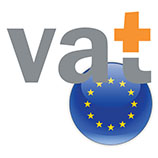EU digital turnover tax – VAT in disguise?
 The European Union (EU) finance minister recently reviewed a proposal to tax U.S. digital groups’ revenue based on the location of their consumers. Nonetheless, such a turnover tax may transgress EU VAT rules and international treaties.
The European Union (EU) finance minister recently reviewed a proposal to tax U.S. digital groups’ revenue based on the location of their consumers. Nonetheless, such a turnover tax may transgress EU VAT rules and international treaties.
The giants of tech to be taxed
This proposed ‘Equalisation Tax’ is aimed at disrupting the lawful corporate structures of companies, such as, Apple, Google, Facebook, and Amazon (dubbed ‘Les Gafa’), who are taxed on net profits. These companies through a mixture of legitimate EU cross-border holdings, investment write-offs, and non-resident trading have paid minimal profits on large revenues. Many of the EU headquarters and selling entities of these firms are located in low tax EU jurisdictions for this reason.
This ‘Equalisation Tax’ initiative has been launched in France and is being supported by Germany, Italy, and Spain. The suggestion is a tax rate on turnover between 2% and 5%.
The suggestion would pursue to create virtual Permanent Establishments subject to the tax in all EU Member States where companies are selling goods. Presently, companies selling within the EU are free to sell goods or services in the other Member States and pay no local corporation tax if they have no operations (Permanent Establishment) in the customer’s country. The sale is subject to local VAT.
Is this VAT in disguise?
Within the EU VAT Directive rules, Member States are forbidden from imposing VAT-like turnover taxes.
Could this proposed tax qualify as a turnover tax? Doubtful. This measure would be a tax on the companies, rather than the final consumer. And, there is no facility for a deduction on input costs. Both of these features could mean the tax would not be measured in conflict with VAT.
Equalisation Tax’ maybe blocked by global rules
There are other barriers to the proposition, even though this ‘Equalisation Tax’ may avoid the VAT restrictions. Unanimous approval for tax measures is required as per the EU Treaties, and countries with substantial U.S. tech investment – such as Ireland and Luxembourg – would perhaps block the measure. Plus global bi-lateral treaties would require to be amended to prevent a loss of EU competitiveness.
amavat Europe provides a one-stop-shop solution for VAT obligations within Europe. We assist clients with a single point of contact that speaks their language and handles all VAT related issues with a standard and cost-efficient approach.
If you have any queries or questions, please do not hesitate to contact amavat Europe.
To find out more information please visit amavat.eu













